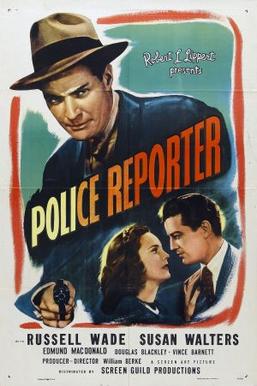Shoot to Kill (1947 film)
Appearance
| Shoot to Kill | |
|---|---|
 Theatrical release poster | |
| Directed by | William Berke |
| Screenplay by | Edwin V. Westrate |
| Produced by | William Berke |
| Starring | Robert Kent Luana Walters Edmund MacDonald |
| Cinematography | Benjamin H. Kline |
| Edited by | Arthur A. Brooks |
| Music by | Darrell Calker Gene Rodgers |
| Distributed by | Screen Guild Pictures |
Release date |
|
Running time | 64 minutes |
| Country | United States |
| Language | English |
Shoot to Kill, also known as Police Reporter is a 1947 American black-and-white film noir directed by William Berke, and stars Robert Kent, Luana Walters, Edmund MacDonald and Russell Wade.[1]
Plot
Being pursued by police cars, a fleeing motor vehicle crashes off the side of the road. The survivor relates the events that preceded the chase in flashback format.
A former gangster is framed by a corrupt district attorney. With his wife and an investigative reporter, he gathers proof of his innocence in hopes of clearing his name.
Cast
- Robert Kent as former gangster "Dixie" Logan aka Judge Joel Conroy
- Luana Walters as Logan's wife, Marian Logan
- Edmund MacDonald as the corrupt DA, Lawrence Dale
- Russell Wade as investigative reporter George "Mitch" Mitchell
- Vince Barnett as Charlie Gill
- Nestor Paiva as Gus Miller
- Charles Trowbridge as District Attorney John Forsythe
- Harry Brown as Jim Forman
- Ted Hecht as Al Collins
- Harry Cheshire as Mike Blake
- Joe Devlin as Smokey, Man Tailing Dale
- Eddie Foster as Bingo, Man Tailing Dale
- Frank O'Connor as Deputy Clem Sparks
- Sammy Stein as Blackie
- Robert Riordan as Ed Carter
- Gene Rodgers as Piano Player
Soundtrack
Gene Rodgers appears on screen performing two of his own compositions; the film's scorer was provided by Darrell Calker.
References
- ^ Shoot to Kill at IMDb.
External links
- Shoot to Kill at IMDb
- Shoot to Kill at AllMovie
- Shoot to Kill at the TCM Movie Database
- Shoot to Kill is available for free viewing and download at the Internet Archive